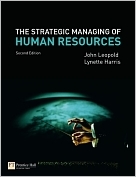| |||||
• polskie
• Zamów informacje o nowościach z wybranego tematu • kontakt |
THE STRATEGIC MANAGING OF HUMAN RESOURCESLEOPOLD J. HARRIS L.wydawnictwo: PEARSON EDUCATION, 2009, wydanie Icena netto: In order to be successful an organisation must be able to mange the relationship between the overall business strategy and the strategies in different resource areas such as HR, finance, information or technology. Managing these resource areas in line with the overall business strategy is key to making those strategies deliverable. Human resources (the knowledge, competencies and behaviours that people bring with them to work) are central to successful implementation of strategy and as both HR managers and Line managers are essential to leading and motivating individuals, both must be involved in the formulation and implementation of HR strategy. John Leopold is Professor of HRM and Deputy Director of Newcastle University Business School, Newcastle University. Lynette Harris is Professor of Human Resource Management and Professional Practice at the Nottingham Business School, Nottingham Trent University. Contents 624 pages, Paperback Księgarnia nie działa. Nie odpowiadamy na pytania i nie realizujemy zamówien. Do odwolania !. |


